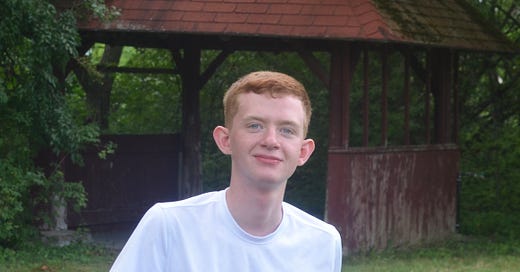Last weekend, Steve and I went to Manhattan to see Plaza Suite with Matthew Broderick and Sarah Jessica Parker. Delayed by two years by the pandemic, we were very excited to finally use our tickets from May 2020. We left Ian alone for most of the day, though my folks and sister came over to bring him dinner. We rarely leave Ian alone, because of the epilepsy and because he has no friends and is completely isolated without us, so this was a nice break for Steve and myself, and probably a nice break for Ian, as well.
The next day, Steve discovered a suspicious screwdriver on his desk. After some questioning of Ian, we pieced together an interesting story.
Ian explained that he watched a video on YouTube about how to expand the capacity of a PC. So, he went down the basement, where we have a pile of old computers that really need to go to the dump. In the Computer Graveyard, he removed a hard drive and a disk drive from a ten-year old PC and then installed them in Steve’s new computer on his desk. Proudly, Ian added that he dusted the inside of the computer. Then he did some clicking and clacking and showed the computer how to recognize the new devices.
Ian doubled the capacity of Steve’s computer. That’s good right? Well, yes, sort of. But Ian has a bad habit of just taking other people’s devices and upgrading them without getting permission first, just as he did that weekend. Some people do not appreciate those upgrades. Some people actually get upset when another person just takes their devices out of their purses or off their desks and improves them.
Now, this doesn’t make any sense to Ian, because better is just better. The fact that people get upset when their technology is made better is not logical to Ian. So, we had to make a rule about this, because it is impossible to explain illogical sentiments to Ian. It’s best to make a rule, rather than go in circles trying to explain human behavior that is more emotional than logical.
So, “Don’t mess with another person’s technology” is the latest entry in the Unwritten Guide to Life that we’ve developing for Ian.
A few months ago, we taught Ian how to do his laundry. We went for the abbreviated method: 1. divide up laundry into light and darks, 2. do everything on a medium temperature and the “normal” setting, 3. pour the detergent into the drawer until it reaches a certain level, 4. fold and put away clothes when done, 5. Sunday is his laundry day, 6. Do sheets and towels, too.
He’s been nailing the laundry. He’s really smart, so I just have to give him directions once. Occasionally, I have been adding additional rules when necessary. Like a couple of weeks ago, Ian left his laundry in the washing machine for over 24 hours. It had gotten a little stinky in there and needed to be washed again before going in the dryer, so we added another rule. 7. Don’t let the wash sit in the washing machine for too long.
Over the weekend, Ian discovered a pile of sweaters that I had washed in the delicate cycle. I hadn’t yet taken them out to stretch out on the drying rack. Thinking that he was doing me a favor, Ian put them in the dryer. RIP my black cashmere sweater from J. Crew and my brand new Celtic sweater that was a huge splurge this winter. Sniff. They are now the right size for a small monkey.
So, now there are two new rules: 8. Don’t put sweaters in the dryer. 9. Best to just leave mom’s laundry alone.
Sometimes Ian’s life lessons are lessons that any young adult has to be taught or muddle through on their own. Jonah didn’t know how to do his own laundry before I sent him to college with a jug of detergent.
Other lessons are necessary because of the autism. It would never occur to Jonah to upgrade his father’s computer without his permission, because he instinctively knows the “don't mess with another person’s technology” rule. Also, because Jonah would never feel the compulsive need to fix technology.
Sometimes these lessons have to happen because he has no friends and very limited experiences. Marginalized and isolated, Ian has spent too much time in special education jails, where he has been unable to learn vital life lessons by talking with friends or observing peers. I have strong feelings about the bigotry of schools and communities.
As we teach Ian how to navigate the world, many of these lessons have to happen organically, sometimes right after a disaster, because there is absolutely no way to predict Ian’s mistakes. We try to think ahead of time about all the things that Ian needs to know, but life and autistic people are random, so we have learned to be nimble and deal with problems in the moment.
We have also learned that when we provide those rules, we have to think like a lawyer and use our language carefully. For example, we had to be careful to tell Ian that he should never mess with anyone’s computer, not just dad’s computer, but he might get the itch to modify my computer someday.
I have to say that we’re having fun with this. Ian doesn’t fight rules and quickly adapts. And it helps me think more about my own rules of life — what is logical, what isn’t, what is a waste of time, what needs an upgrade. We’re all works-in-progress, after all, and I certainly can make adjustments to make sure that I’m producing, thriving, respecting others, and not shrinking the good sweaters.
LINKS
Secret Agreements in Special Education
I’m a College Student with a Disability. Stop Treating Me Like a Child.
From my personal newsletter:





